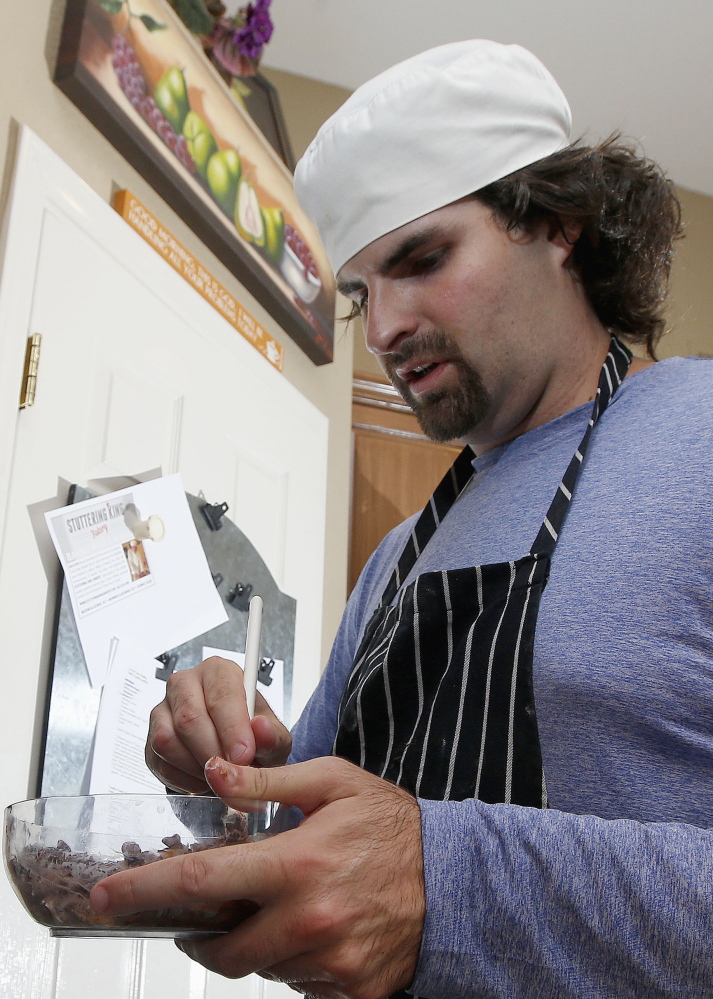NEW YORK — When Matt Cottle asked his boss to let him work in the supermarket’s bakery, she told him he’d never do anything more than collect grocery carts.
After six years of bagging groceries and pushing carts, Cottle wanted more. He had already learned how to do some baking.
Cottle is autistic. And today he’s an entrepreneur, the owner of Stuttering King Bakery, turning out batches of cookies, brownies and scones for cafes and businesses and groups that need catering.
“I was like, OK, I am destined to do something greater than that,” Cottle said in the kitchen of his family’s Arizona, home, where he spends hours each day filling orders. He generates $1,200 monthly. He named the business for Britain’s King George VI, whose struggles to speak were the subject of the film “The King’s Speech.”
Cottle is one of few known small business owners with autism, a brain disorder that affects a person’s ability to comprehend, communicate and interact socially. There are varying degrees of autism, but even autistic people with the greatest capabilities can find it impossible to get a job because they take longer to read or process information, or because they struggle to hold conversations. One in 68 people have some form of autism, according to government figures.
There is a growing movement to help autistic adults find jobs, but for Cottle, the answer was a business of his own.
Cottle had taken training to do search and rescue operations. And he tried working in a bakery. Both times, he encountered people who didn’t understand him, and who ended up yelling at and insulting him, his mother, Peg Cottle, said. He wanted to enroll in a culinary school, but an administrator gently told him and his parents it wouldn’t work out. Four years ago, the Southwest Autism Research & Resource Center connected Cottle with a pastry chef who mentored him. In August 2012, he got an order from a cafe operated by Phoenix-based SARRC. At that point, Cottle told his parents he was starting his own baking business.
“I’m happy as an angel,” he says.
INSPIRED BY A KING
When Cottle’s parents tried to help him get a job, they explained to prospective bosses that because he is autistic, he needs more time to understand instructions. The companies either didn’t want to take the time to learn how to work with him or they assumed Cottle might do or say inappropriate things. He grew frustrated by the unsuccessful attempts to find work.
“He was at a brick wall before he started his bakery,” Peg Cottle said.
Soon after starting, Cottle and his mother attended entrepreneurship training classes offered by Seed Spot, an organization that helps socially responsible businesses.
“He’s legitimate. The product he produces is the real deal. His disability doesn’t even come into play as far as I’m concerned,” said Chris Norcross, manager of building company and Stuttering King customer Mortenson Construction. He orders as many as 300 cookies at a time.
A FAMILY AFFAIR
Autistic owners don’t run their companies by themselves. Support from family members to interact with the public, take orders and handle marketing and billing is vital.
Peg Cottle takes orders and does marketing for Stuttering King Bakery. Cottle is able to speak, but talking on the phone can be difficult. If a customer gets chatty and strays from the basics of placing an order, it can be hard for Cottle to understand.
Vinnie Ireland has limited language ability but owns landscaping company Weed Whacking Weasel in North Carolina. The autistic man does leaf-blowing, hedge-trimming, mulching and other tasks, and works with an assistant trained to help the autistic. His mother, Lori Ireland, handles marketing and billing. The business has between six and 10 residential and commercial customers, depending on the time of year.
Send questions/comments to the editors.



Success. Please wait for the page to reload. If the page does not reload within 5 seconds, please refresh the page.
Enter your email and password to access comments.
Hi, to comment on stories you must . This profile is in addition to your subscription and website login.
Already have a commenting profile? .
Invalid username/password.
Please check your email to confirm and complete your registration.
Only subscribers are eligible to post comments. Please subscribe or login first for digital access. Here’s why.
Use the form below to reset your password. When you've submitted your account email, we will send an email with a reset code.